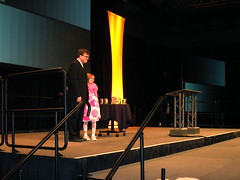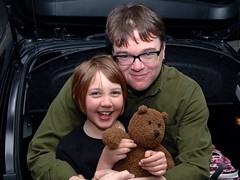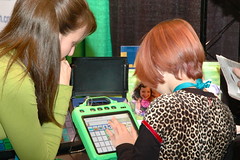Okay, first of all, the important news. Schuyler's solo trip on an airplane? A total success. (Is it mere coincidence that Schuyler recently presented a class report on Amelia Earhart?) Everyone had a great time, my mom got to spend some time with her weird Martian grandchild and get a little better understanding of who she is, and of course Schuyler made new friends on both legs of the trip. Thankfully, the boys she met on the flight back were actually BOYS and not grown men; I must review the concepts of "stranger danger" and "just because your Big Box of Words has (now had) your address and phone numbers programmed into it doesn't mean you should necessarily share that information" with her once again.
All in all, the experiment was a great success, and so I will be ready to put Schuyler on a plane by herself again in another nine years or so. Because seriously, for that hour she was on the plane on Friday, and again on her way back? I aged six months each way. I had no idea that my memory could recall so much of the movie
Fearless.
Julie and I spent the weekend in Austin, where, after we got a little business out of the way on Friday, we proceeded to have a swell weekend, just the two of us. It was interesting, visiting parts of Austin such as South Congress Avenue that were sort of new to us, even though we lived there for a year and a half. Interesting, and thought provoking.
What we immediately noticed when we visited all the quirky little shops and restaurants was a near complete absence of children. We saw signs in many of the store windows banning strollers and expressing in a variety of cute ways the idea that if kids WERE to come in the store, they were to behave like small adults at all times.
It wasn't necessarily off-putting; these weren't really kid-friendly stores (even the toy stores were more like places for ironic hipsters to buy clever doodads to put on their desks at work to help mask the whiff of corporate slavery), and even if Schuyler had been with us, we always demand (and sometimes even receive) good behavior from her. I'm all for embracing the fun carefree nature of childhood (surely that's no surprise), but I still believe kids need to learn to socialize properly, which often means taking them out to good restaurants and public places that aren't necessarily adorned with cartoon characters. I don't believe in excluding kids from public places, much to the annoyance of many a childfree kook who has emailed me over the years, but neither do I believe in letting them grow up feral at the expense of the world around them.
But what these stores and their environments did bring home to us was the simple fact that Austin in general is not a terribly child-friendly place. I suppose I'm just asking for hate mail by saying that, but there it is. Austin's a city for young people, that much seems clear, but not so much young people starting families. And again, that's fine, we don't need to take over every American city, covering the land with the scourge of Charles Edward Cheese. But this fact might contain the beginnings of an understanding to why Schuyler's school situation there was such a failure, and why she's found so much success in a town like Plano, where one might expect her differentness to be shunned rather than celebrated.
Now in fairness, Schuyler was not in the Austin schools, but in another local school district in the area. But my impression from speaking to a number of parents and SLPs is that while many of the Austin area schools are trying very hard to improve special education in their programs, they are nevertheless fighting something of an uphill battle. A number of Austin schools have been in danger of losing accreditation or even being shut down after receiving unacceptable ratings, including one, the SAILL Charter School, which was established specifically for the purpose of providing a mainstream education to students with disabilities.
Is there a relationship between a community's approach to families and the quality of its schools? That seems like a pretty logical assumption to make, although it would really just be an assumption on my part. But I do think that educational priorities in this country have been seriously skewed for a long time, and in a state with as checkered of an educational record as Texas, the problem seems especially acute. I addressed it in the original draft of my speech to the Texas Speech Language Hearing Association Convention a few weeks ago, and while I eventually cut part of it out in the interest of time, I sort of wish I hadn't now.
The right to an equal education in which every child can communicate and participate at the highest level possible for their abilities is a civil right. If we as a society are going to stand up and say that we believe in a public education for every citizen, we need to make good on that promise, and to put our immense resources and commitment behind that promise. And if we can’t do that, if we can’t educate our people, I’m not sure what’s left to do except sit on the couch, turn on American Idol and wait for the Visigoths to climb over the walls.
I work in the city of Arlington, in the Dallas area, and every day as I drive into the city, I see the looming beast that is the new Cowboys Stadium. I’ve seen it referred to as the Enormodome, although I usually just refer to it as the Death Star. The current cost of that facility is estimated at over one billion – BILLION, with a 'b' – dollars. To assist the Cowboys in paying the construction costs of the stadium, Arlington voters approved tax increases that will provide $325 million in funding. At the same time, about half of the over one thousand school districts in Texas will suffer budget shortfalls this year, including Arlington, which will come up about $15 million short.
We as a society must do better. We simply must.
On the surface, it seems like a city as conservative as Plano wouldn't be a very welcoming one for us. Julie and I are both very liberal, and neither of us is religious at all. (I self-identify as an Agnostic, but Julie is a full-blown Atheist. She's hard core.) But the reality of Plano's conservatism isn't so much that people here are largely rich or Republican or Christian, although those points are certainly true enough.
Plano is a town that values family above all else. They have shown it with a financial and philosophical commitment to education, and the result is a public school system that rivals the best private schools in some other communities. Special education in particular has received a strong commitment here, and while there are problems here like anywhere else, I never see the casual disregard for students with disability here that were so familiar to us before. We've never been told that Schuyler couldn't receive a service because the school couldn't afford it. And as the parent of a special needs parent, that is a very powerful statement to be able to make.
When the McCain-voting, Jesus-loving, SUV-driving people of Plano met the lefty, Socialist, godless Rummel-Hudsons, they saw a family that was willing to pull up stakes and move, as often as it took, to provide an educational opportunity for their daughter. When the book came out, they saw a father who cared and hurt and loved for his little girl, and who was committed to advocating for thousands, maybe millions, of kids like her.
And when they met Schuyler, they didn't see the purple hair or her "Punky Brewster meets The Addams Family" clothes, and they didn't recoil at her disability. They saw her as one of their own.
It might be tempting to try to draw some sort of ideological lesson from all this, and I'm sure a few conservatives will try. But it's not about the politics. There are plenty of wealthy, conservative communities that don't take care of their kids, particularly those with disabilities. Highland Park in Dallas is among the richest in the state, for example, but while neurotypical kids can expect to be very well educated and end up in Ivy League schools, its reputation for special education and for kids who don't fit a traditional learning environment are pretty awful. And two of the great AAC success stories I've seen first-hand were in the very liberal San Francisco Bay Area; one was in Oakland, a community with an extremely diverse student population, to put it gently.
What it comes down to is priorities. And those priorities are set by YOU, the members of the community. You set them when you choose just how vigorously to to fund your public schools, where federal laws for students with disabilities provide protections that don't bind private schools. You chose how strongly to commit to the future and how hard you are willing to work to build a world where every kid is given the opportunity to reach their potential, even those who are broken or those who are gifted in ways that defy traditional pedagogy. Those kids often grow up to be adults who are active and contributing members of their societies, rather than wards of the state. That's a good conservative argument right there.
And as parents in particular, we are the ones who set the expectation for a community and for our schools. I've been writing and speaking a great deal over the past year and a half about empowering parents to advocate effectively for their kids. Not just by being squeaky wheels (although sometimes it's the only option available), but also by understanding how the system works and what they can reasonably expect their schools and teachers to accomplish. I've got little patience for teachers and SLPs who are afraid of the technology and the extra work required to help kids like Schuyler, but I don't have much more for parents who won't make the effort to learn about their child's disability and to research and really educate themselves on the possibilities.
I recently read an essay for the AAC Institute, written by longtime AAC advocate Robin Hurd, titled
Defining Our Terms: Perspectives on AAC Funding. One paragraph resonated with me, for obvious reasons:
Several families have gotten their children AAC systems outside of the "normal" process, and are seeing good outcomes for their children who use AAC in spite of the lack of involvement of an SLP. The growing availability of information via the internet makes getting the needed information more and more possible for families. The dirty little secret of AAC is that families are often driving the process. Without the efforts of families, many children who need AAC would not have access to the devices or be taught to use them effectively. While some SLPs are knowledgeable in AAC and are a credit to their profession, too many know nothing about AAC, yet continue to attempt to provide guidance to children and the schools that teach them, to the detriment of the children they are supposed to serve.
It doesn't just apply to SLPs and teachers, and its certainly not specific to AAC users. Parents of disabled children will always be their best advocates, and they'll always find more success when the community in which they live places a high value on educating their kids in general. I understand why many communities want to couch this issue in terms of money. That's why it's more important now than ever to refuse to do so. Special education is a civil rights issue, nothing less. Our commitment to public education needs to be total or not at all. Can you imagine a school district announcing that while they'd love to provide an equal and appropriate education to students of color or lower income, they just can't afford to do it this year? Can you imagine the public outcry? So why is it any different for kids with a disability?
I'm not trying to disparage Austin. It's a city I love and always have. But I'm gradually getting a better understanding of why we might have been destined to fail there, and why we were also destined to find success in the last place we might have looked. I wish there were more places where broken children could find their way, because there's a real value to the community in having these families amongst them, something beyond treacly inspirational stories about God's little miracles or learning to love Holland. It's a tougher value, but it's one that is real.
Hemingway was right.
"The world breaks everyone and afterward many are strong at the broken places."






 Gwen Zepeda's novel Houston, We Have a Problema is bound to be pushed into some pretty narrow genre categories -- latina chick lit, perhaps -- which is a pity, because Zepeda has written an engaging and fun work that transcends its regional and cultural environment and is quite simply a well-written and entertaining piece of work.
Gwen Zepeda's novel Houston, We Have a Problema is bound to be pushed into some pretty narrow genre categories -- latina chick lit, perhaps -- which is a pity, because Zepeda has written an engaging and fun work that transcends its regional and cultural environment and is quite simply a well-written and entertaining piece of work.




















